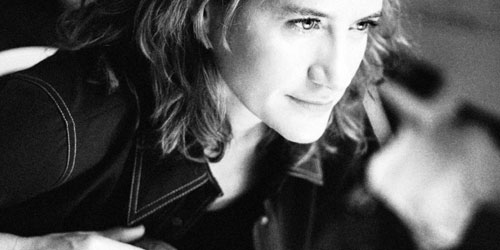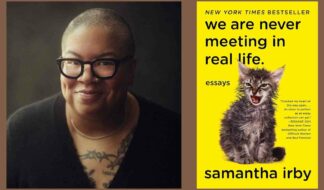
"As a human being there are moments when we're angry, when we're funny, and when we want change. And folk music embraces all of those impulses. Somebody's got to put something at risk and say something that makes the audience slightly uncomfortable. We're here to throw that stink bomb and say the thing that no one's saying." – Susan Werner, emcee of the 34th Ann Arbor Folk Festival
34th Ann Arbor Folk Festival
6:30 p.m. Jan. 28-29
Hill Auditorium
www.theark.org
This is how Susan Werner remembers the Ann Arbor Folk Festival last time she hosted in 2005: "It's Woodstock with a roof, basically."
Playing the part again this year at The Ark's fundraiser, an annual music lover's dream on Jan. 28 and 29 at the Hill Auditorium, the Chicago singer-songwriter promises new songs from her unreleased 10th album, "Kicking the Beehive," out March 1, along with rapier-like wit, Ohio knocks and Ann Arbor scoop.
"There's all kinds of things about Ann Arbor that maybe people in Ann Arbor don't even know," she says. "And then I'm planning to compile a set of facts denigrating the state of Ohio, to feed into the rivalry. It's there, so why not throw some metaphorical stink bombs?"
But there's more to hosting than being saucy – or pulling a Cher, as Werner vows to do ("If you go through the whole evening in one wardrobe, you failed") – when an event as treasured as this one's underway. Big acts like The Avett Brothers and The Swell Season headline each night, respectively, with many other acts – including Vienna Teng, Citizen Cope, Mavis Staples and Judy Collins – filling out the lineups. Werner's biggest drill? Remembering names.
"I'll have to study up, but I'll be waiting until that week and then doing a crash course on everybody," she says.
Werner knows how awkward it is if she doesn't. Friend and fellow folk artist Trina Hamlin, whom Werner returns to Ann Arbor with in February for her own show at The Ark, was introduced as Shemekia Copeland one year. "Here comes this really tall white woman with a harmonica named Shemekia Copeland. I mean, there was nothing about this that was right," she recalls, laughing.
"The emcee's primary job is to pronounce the names of the acts correctly and introduce the acts in the correct order. If I can get that right, then I'll probably have done what is really the most important job."
In previous years, most recently with hosts Jeff Daniels and Patty Larkin, the emcee also wedges in some music between acts to keep the show's musical momentum from stalling. Werner plans to as well, whipping out upbeat songs from her new disc.
"Part of what I'm supposed to do is tap dance between acts, let's face it," she admits. "But also, part of it is to have a thread that runs through the evening, to give it some coherence – otherwise the acts may not have anything to do with each other. But if the emcee has a through-line for the evening, it helps the whole evening hang together better and, ideally, makes for a more satisfying experience for everybody that's there."
The crowd, which she speaks of almost like some type of divine miracle, is "so tuned in, so in the mood. And they're sitting there in seats facing forward."
Of course they are. Folk music fans are some of the most disciplined, sit-up-straight-and-listen audiences out there, and anyone who's seen a show at The Ark knows so. But folk, according to Werner, is more than just a genre. It, like all music, taps into the human condition.
"If music is just a pleasant listening experience, it overlooks a whole part of what it is to be a human being," she says. "As a human being there are moments when we're angry, when we're funny and when we want change. And folk music embraces all of those impulses. Somebody's got to put something at risk and say something that makes the audience slightly uncomfortable. We're here to throw that stink bomb and say the thing that no one's saying."
Werner does so on "Kicking the Beehive," an 11-song Americana album that's raucous and real in its bald commentaries about homelessness, addiction and isolation. The set, her follow-up to 2009's "Classics," is her first disc without a concept since 2001's "New Non-Fiction," and it's another departure for the always-evolving musician (she must have made Liza Minnelli proud with 2004's "I Can't Be New," a cabaret detour).
"The thing that pulls this album all together is that every song and every performance is more Southern-fried than anything I've ever done before," Werner says, marveling over the landscapes, two-lane roads, juke joints and even the barbecue during her blues pilgrimage through the Mississippi Delta. "It's sort of like an Iowa girl goes downriver.
"I wanted to get out of the city limits. I wanted to have to rely on some new understandings and make a record that got out of town, and this record gets outside of town."
Producer Rodney Crowell helped take it there, pushing Werner to cut the record live off the floor, something she had reservations about but now appreciates what it did for the album's ambiance.
"There's an urgency to the performances," she says. "The record sounds like it was made in Nashville in the very best way. Every song has some dirt under its fingernails."
Recording in Music City embellished that sound, one she says couldn't have been rendered as well anywhere else but in Nashville. "Everybody there gets it. Instead of just talking about it, people just do it. You have a drummer from Mississippi. Vince Gill's from Tennessee. You have these people who just speak the language; it's their first language."
She worked with Gill on "Red Dress," a loose country cut with chomping guitars and less obvious pronouns. Who's the dress for? She says, "You can read into it multiple ways. And for those of us who put the bacon in the GBLT sandwich" – like she does – "this is our public service to create these songs that somehow work for everybody."
Even Gill got in on the gender-bending fun: "It was funny because Vince Gill's sitting in on that track and everyone is making jokes about Vince in a red dress."
But for whatever romps were had in the studio, several songs are serious – and seriously heartbreaking: "Doctor Doctor," for instance, is from the perspective of a lesbian whose partner is dying. Then there's the protest anthem, "I Know What I Want," about equality.
"What I'm proudest of with this record is the balance between ballads that really draw you in and songs that deliver on just plain loud, driving-down-the-highway, crank-to-11 fun."
That same balance, of pure and pushing it, should make for two memorable nights when Werner anchors the Folk Festival. She thinks of the gig like this: "I'm the host of the party. Somebody else brings the appetizers, but my job is to make sure everybody meets each other and has a drink and a good time."
She pauses long. "And I'm bringing the bacon!"











